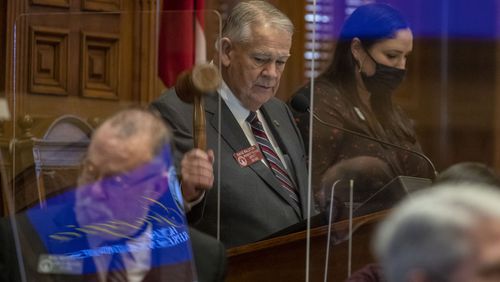Georgia leaders announced plans Wednesday to hand out $1,000 bonuses to more than 57,000 state employees who earn less than $80,000 a year.
Last month, Gov. Brian Kemp announced the same bonuses for Georgia’s public school teachers.
Where would the money come from?
In both cases, the money for the bonuses is coming directly or indirectly from the federal government, which has provided billions of dollars to schools and greatly increased funding for the state’s Medicaid program.
The increase in federal money for Medicaid, which provides health care to the poor and disabled, means the state has to spend less, providing the savings used for the bonuses.
Tens of thousands employees in the University System of Georgia were not included in Wednesday’s announcement.
By law, the state can’t tell the Board of Regents, which oversees the University System, to give the $1,000 bonuses. The state, however, provides more than $2 billion in funding to public colleges and universities annually, so lawmakers have political leverage.
House Speaker David Ralston, R-Blue Ridge, said there are discussions with the system to have it also hand out bonuses to its staffers earning less than $80,000. House Appropriations Chairman Terry England, R-Auburn, said about 36,000 university employees would be eligible if the Board of Regents agrees to system bonuses.
Who won’t receive bonuses?
Members of the General Assembly, most of whom are paid $17,342 a year, will not receive the bonuses, which will go to full-time state employees. Being a member of the House and Senate is considered a part-time job.
During a Capitol news conference, Ralston, Kemp, and Lt. Gov. Geoff Duncan praised state workers for what they have done during the COVID-19 pandemic.
“We’re talking about frontline employees at the Georgia Department of Public Health, who have fought COVID-19 day after day, working to get Georgians tested and vaccines distributed,” Ralston said.
“We’re talking about our Georgia State Patrol and other state law enforcement who have tried to keep the peace in the tough days that we’ve seen over the last year ... food inspectors who stayed on the job and kept our food supply safe, and we’re talking about caseworkers who have continued serving and protecting children who are victims of abuse or neglect,” Ralston said.
Kemp said, “Our employees have worked incredibly hard despite the global pandemic, they have been going above and beyond the call of duty.
“I believe we are doing our part to say ‘thank you for all you have done.’ ”
About the budget
The announcement came as the two chambers of the Legislature are about to give final approval to the midyear budget that funds state agencies through June 30.
The plan would hike overall spending by $654 million.
The largest increase is in education, where the House and Senate went along with Kemp’s proposal to backfill 60% of the spending reductions that lawmakers approved last year, when they cut 10% because of fears that state revenue would plummet due to the COVID-19 pandemic.
That didn’t happen. In fact, state tax collections have increased 6.3% during the first seven months of this fiscal year.
Why a midyear budget?
The House and Senate agreed to push through a midyear budget in case they have to suspend the session — as they did in March — because of the pandemic.
The budget would also pay for 500 new school buses and increase support for nursing homes hit hard by COVID-19. It would add high-speed internet in rural areas and provide 10% raises for corrections and juvenile justice guards.
And it would spend $27 million to quickly modernize the Department of Public Health’s computer system that tracks immunizations and pay to hire several new staffers at the agency that has spent most of the past year fighting the COVID-19 pandemic.
By the numbers
$1,000: The amount for bonuses to some state employees in a proposal backed by many Georgia leaders
$80,000: Maximum employees can make per year to be eligible for the bonuses
57,000-plus: Amount of state employees who are eligible for the bonuses








